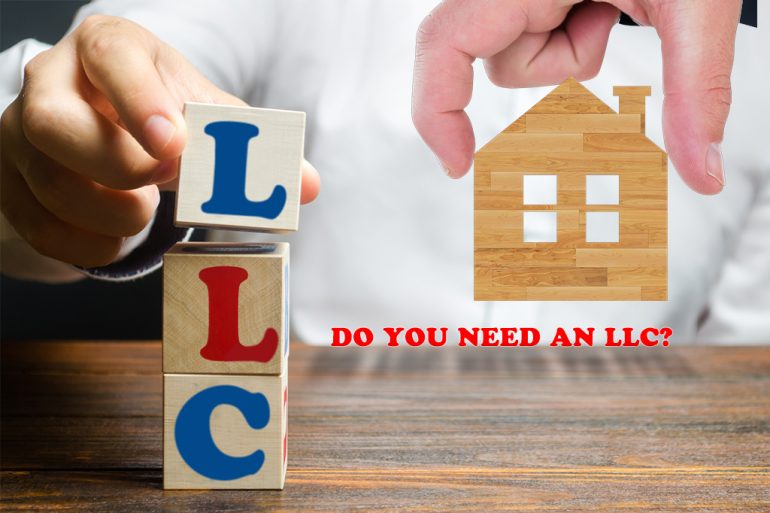Do You Need an LLC to Flip Houses?
Do You Need an LLC to Flip Houses?
Being a house flipper is a great way to grow your income without the regular nine-to-five job. However, house flippers work for themselves. It’s essential to have a firm understanding of the importance of forming a business entity before getting started.
While you can legally flip a house without an LLC, it can put your business, personal assets, and family at risk.
Benefits of Having an LLC for Flipping Houses
You can choose to form many different types of business entities when you’re starting your house flipping business. Individual property investors should select an LLC because they’re simple to structure and provide tons of benefits.
The tax benefits are some of the most significant advantages to forming an LLC to flip houses. Common tax-deductible expenses include:
- Cost of purchase
- Cost of renovation materials
- Cost of labor during renovation
- Vehicle and travel expenses
- Office expenses
- Cost of building permits
- Loan interest
- Cost of a real estate agent
- Business expenses
- Legal fees
- Accounting fees
With all of these deductions, the final profit you make after you sell the newly renovated house will be significantly higher.
There are risks involved with any business, and flipping houses is no exception. If things go wrong during a deal, setting up your business as an LLC can help prevent your personal assets from being used as collateral to pay back debts.
When it comes to your business and your personal assets, it’s always better to be safe than sorry.
The flexible structure of an LLC allows your business to adapt over time, including adding new partners as you grow. LLCs enable you to easily add a partner to your business even if your business started without one. This flexibility allows you to continue being an LLC without the need to set up an entirely new business.
Because the LLC is so flexible, it also makes your business easy to sell.
If you are operating as an individual and don’t have an LLC, you will not be able to sell your business even if it becomes highly profitable.
Lets You Creatively Buy and Sell Real Estate
Having an LLC hold your real estate means it’s possible to transfer ownership of real estate without a closing. Why is that something you would want to do?
- Skip the closing, sell the business. An LLC can save you thousands of dollars on closing costs by allowing you to easily sell your company, which includes the property, to the buyer. This means that you can sell the house without needing to close, but you will have to sell your company in exchange. Once you’ve sold the first LLC, you can use that money to set up another LLC and move on to your next flip.
- Buy and sell in tight situations. There are many times when you are required to hold real estate for months or even a year or more before you can sell within an HOA or other association. You can skirt around this rule if you simply sell the LLC that owns the property to your buyer. The nosy HOA lady won’t even know it changed hands!
Disadvantages of Flipping Houses as an LLC
While there are plenty of advantages to using an LLC to flip houses, there are also a few disadvantages that every investor should consider before moving forward with this strategy.
When you form an LLC, you need to open up a new business bank account specifically for your business. Individuals don’t have to go through this process and can use their personal bank account for capital.
Unfortunately, many banks will not lend to an LLC based only on business credit unless the business has an established credit history. If your LLC is younger than two years old, you will have a difficult time finding a lender because banks know that LLC members cannot be held liable for the LLC’s debts.
In most cases, if your business is new, you will be required to personally guarantee the loan in addition to the collateral of your property.
Potentially Weak Legal Protections
Your LLC’s legal protections are only as strong as your founding documents and paperwork. While you may have chosen to form an LLC so that you won’t be held personally liable for debts, courts may choose to hold the LLC’s members personally liable. When this happens, it’s called “piercing the corporate veil,” and small LLCs are more likely to get pierced.
Complicated Legal and Accounting
When it comes to forming a new business, you’ll have to face legal and accounting complications. Remember, this isn’t the regular nine-to-five job, so you’ll have to report your income and losses yourself.
If you are a single-owner LLC, the IRS will treat your taxes like they would for a sole proprietorship. The LLC itself will not pay taxes and does not have to file a tax return. However, as the sole owner of the company, you’ll report all of your profits and losses when you submit your tax returns.
Because LLC members are not employees and have not made contributions to Medicare and Social Security, you will likely have to pay self-employment taxes. The self-employment tax rate is currently 15.3% of your net income.
If your LLC grows enough for you to have employees, this will further complicate both the legal and accounting sides of the business.
Working with both a CPA and lawyer who understand the real estate industry can help you get your LLC started on the right foot.
Other Entities for House Flipping Businesses
Other common business entities used by real estate investors are S corporations, C corporations, and sole proprietorships. LLCs are the most popular option because they’re flexible, allowing flippers to readjust their business structure when needed.
S Corporations
S corporations provide partners within your company with personal asset protection while accounting for incomes and losses.
They also come with tax benefits; companies structured as S corporations don’t pay taxes at the federal level. Instead, they pass income and losses made through the shareholder’s individual tax returns.
C Corporations
C corporations are a holding company structure. While this model provides personal asset protection, it comes with a significant disadvantage.
Taxable income made under this entity is taxed first at the business entity level, and secondary individual income taxes also apply. Ultimately, house flippers will pay double the tax.
Sole Proprietorship
If you don’t have a partner, you can also choose to be a sole proprietorship. This business structure has one single owner, allowing him or her to easily report business income and expenses directly on personal tax returns.
Unfortunately, as a sole proprietor, you do not have the same protection as you would with an LLC; you would be personally responsible for your business debts.
How Much Does an LLC Cost?
Setting up your LLC will cost anywhere from $50 to $500, depending on where you live. In most cases, you’ll only pay a one-time filing fee to form your LLC.
From there, LLCs are typically low maintenance — there are just a few requirements to keep them active. You may need to pay an annual fee and send in reporting, depending on the state in which you’re registered. You will also have to file state and local tax returns.
LLCs: The Best Business Entity for House Flippers
While there are tons of options out there for forming your business, an LLC is the most flexible, providing you with liability protection while allowing you to add a partner when necessary.
While you can flip houses without an LLC, your personal assets are not protected, and you could be losing out on valuable tax deductions that can help your business grow.








